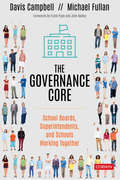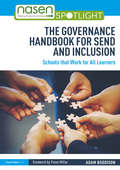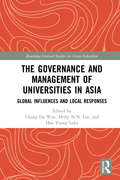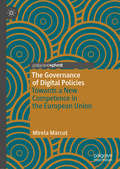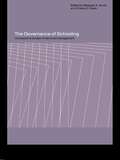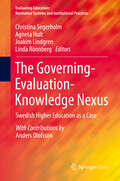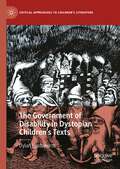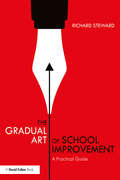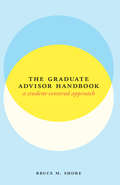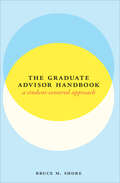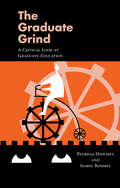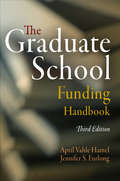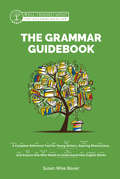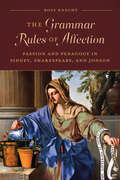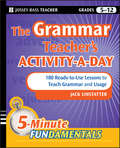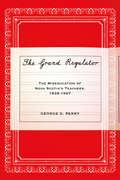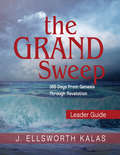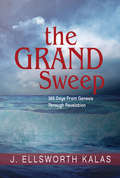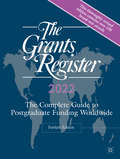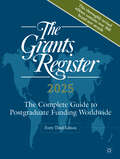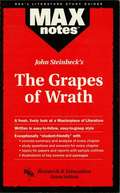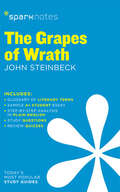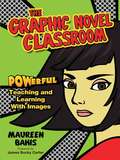- Table View
- List View
The Governance Core: School Boards, Superintendents, and Schools Working Together
by Michael Fullan Dr. Davis CampbellLead into the future effectively with the Governance Core approach! Designed to guide educational leadership past difficult and formidable challenges, the governance system outlined in this book will lead to school districts and schools operating at the highest levels of effectiveness. Davis Campbell and Michael Fullan call for school boards, superintendents and school leaders to work cohesively with the same mindset to raise clarity, status, and efficacy. Practical and authentic, the Governance Core is based upon: A governance mindset A shared moral imperative A unified, cohesive governance system A commitment to system-wide coherence A focus on continuous improvement in the district
The Governance Handbook for SEND and Inclusion: Schools that Work for All Learners (nasen spotlight)
by Adam BoddisonThe Governance Handbook for SEND and Inclusion supports governors and trustees in developing effective strategic practice to ensure an inclusive culture in their schools. Building on the six principles of effective governance, it provides useful tips on achieving the right balance of support and challenge so that schools are enabled to meet the needs of learners with SEND (Special Educational Needs and/or Disabilities). Relevant for all governors and trustees across primary and secondary schools, multi-academy trusts and specialist settings, the book focuses on the role and expectations of governance in relation to SEND and inclusion. It includes: An introduction to SEND, inclusion and the six key features of effective governance Practical advice and guidance for SEND Governors and trustees on how to strategically monitor and review SEND provision A discussion of how the relationship between SENCOs, SEND Governors and Headteachers works in practice Advice on developing an inclusive culture in your school Sources of ongoing support and resources from professional organisations and websites. This book will be beneficial to all education professionals working at a strategic level, including governors and trustees, school leaders and SENCOs. It recognises the central role that governors and trustees play in setting the inclusive ethos of a school and suggests ways to ensure that strategic practice is as effective as possible.
The Governance and Management of Universities in Asia: Global Influences and Local Responses (Routledge Critical Studies in Asian Education)
by Chang Wan Molly N.N. Lee Hoe LokeThis volume seeks to identify and explore the dynamics of global forces on the development of higher education in Asia, in particular, how neoliberalism has affected reforms on university governance and management in the region. It includes a set of country-specific studies on how various countries have responded to the dominant neoliberal ideology at the systemic, institutional, and process levels. The focus is on the relationship between the state and the universities, which is usually reflected in the degree of autonomy and accountability allowed in a particular higher education system. The selected countries are Cambodia, China, Indonesia, India, Japan, Malaysia, Singapore, South Korea, and Thailand. Each case study examines the establishment of corporatised or autonomous universities in the country focusing on (i) the acts, reports, and/or policies that led to such a move as well as the rationales behind the move; (ii) the changes in the governance and organisational structure of the universities, highlighting the kinds of autonomy that the universities have; (iii) the new management strategies, techniques, and practices that have been introduced to the university including the internal and external quality assurance mechanisms, and (iv) some of the tensions, conflicts, and acts of resistance that may have emerged.
The Governance of Digital Policies: Towards a New Competence in the European Union
by Mirela MărcuţThis book examines the efforts of the European Union, both past and ongoing, to harness the socio-economic potential of the internet in public policy-making. In order to achieve this, the author delves into the interactions between actors in the process of EU decision-making, using an outlook which focuses on how both multi-level and experimentalist governance can provide solutions for digital policy governance. The book also addresses the involvement of local and regional authorities in digital policy-making, both in how they endorse decisions made at the EU level, and in how they contribute directly to digital policy-making in their own localities.
The Governance of Schooling: Comparative Studies of Devolved Management
by Charles D. Raab Margaret A. ArnottRecent reforms in the governance of schooling have affected roles, relationships and decision-making within schools and between them and the wider community. Using empirical and theoretical approaches this book describes, analyses and compares the effects of devolved management on secondary schools in a number of countries. It casts a critical light upon policy assumptions and aims, challenging assumptions about the way policy works in practice. Through a comparative international perspective, which looks at countries including the UK and the US, the conflicting options for school governance are addressed. These include: *parental participation and school management policy *professional, managerial and market principles in education *school-based decision-making and the implications of overarching government policies *devolution and centralisation. This is a timely study for practitioners in education, policy-makers in local and central government, academics and students of education policy and management.
The Governing-Evaluation-Knowledge Nexus: Swedish Higher Education as a Case (Evaluating Education: Normative Systems and Institutional Practices)
by Anders OlofssonThis Open Access book analyses the interplay between governing, evaluation and knowledge with an empirical focus on Swedish higher education. It investigates the origins, logics, and mechanisms of evaluation and quality assurance reforms and their dynamic interactions with institutional, national and European policy contexts. The chapters report findings from extensive empirical studies that offer detailed insight into the work of governing in higher education, by giving voice to actors at various levels and positions including the ministry, national agency and University employees. Central themes include the influence of European policy, changing system designs, media relations and quality assurance enactments in University institutions. The book also explores the ways in which an emerging professional cadre, labelled qualocrats, enacts and mediates evaluation and quality assurance policy and practice. Taken together, the expanding evaluation machinery in Swedish higher education highlights the pivotal role of knowledge as a governing resource, and points to special features of evaluation as a particular form of practice that makes knowledge work for governing.
The Government of Disability in Dystopian Children’s Texts (Critical Approaches to Children's Literature)
by Dylan HoldsworthThis book takes up the task of mapping discursive shifts in the representation of disability in dystopian youth texts across four historical periods where major social, cultural and political shifts were occurring in the lives of many disabled people. By focusing on dystopian texts, which the author argues act as sites for challenging or reinforcing dominant belief systems and ways of being, this study explores the potential of literature, film and television to act as a catalyst of change in the representation of disability. In addition, this work discusses the texts and technologies that continue to perpetuate questionable and often competing discourses on the subject.
The Grace and Duty of Being Spiritually Minded: Declared And Practically Improved
by John OwenJohn Owen (1616 – 24 August 1683) was an English Nonconformist church leader, theologian, and academic administrator at the University of Oxford. Owen was educated at Queen's College, Oxford, where he studied classics and theology and was ordained. Because of the "high-church" innovations introduced by Archbishop William Laud, Owen left the university to be a chaplain to the family of a noble lord. His first parish was at Fordham in Essex, to which he went while the nation was involved in civil war.Oliver Cromwell liked Owen and took him as his chaplain on his expeditions both to Ireland and Scotland from 1649-1651. As a result, Owen's fame was at its height from 1651 to 1660, during which he played a prominent part in the religious, political, and academic life of England. Shortly after the Restoration of the monarchy in 1660, he moved to London, where he was active in preaching and writing until his death. He declined invitations to the ministry in Boston (1663) and the presidency of Harvard (1670) and chided New England Congregationalists for intolerance.-Print ed.
The Gradual Art of School Improvement: A Practical Guide
by Richard StewardSchool improvement in recent years has largely focused on rapid improvement and quick fixes. Yet, genuine and sustainable school improvement is complex, gradual and incremental. It requires developing a culture and focusing relentlessly on teaching and learning. The Gradual Art of School Improvement is a comprehensive practical guide to school improvement, covering aspects such as improvement planning, staff development, the learning environment, dealing with outside pressures including inspection, curriculum design and the role of leaders at all levels. It includes: Detailed accounts of the steps that can be taken to create a positive learning culture over time Case studies and worked examples, concentrating on the practical aspects of school improvement from the perspective of an experienced and successful head teacher Ready-to-use practitioner resources that readers can adapt and use in their own settings Accessibly written and entertaining, this book is an invaluable resource for leaders at all levels and stages of their career.
The Graduate Advisor Handbook: A Student-Centered Approach
by Bruce M. ShoreIn the sink-or-swim world of academia, a great graduate advising can be a lifesaver. But with university budgets shrinking and free time evaporating, advisors often need a mentor themselves to learn how to best support their advisees. Bruce M. Shore, an award-winning advisor with more than forty years of advising experience, is just the coach that graduate advisors need. With The Graduate Advisor Handbook: A Student-Centered Approach, Shore demystifies the advisor-student relationship, providing tips and practical advice that will help both students and advisors thrive. One of the first books to approach advising from the advisor's point of view, the handbook highlights the importance of a partnership in which both parties need to be invested. Shore emphasizes the interpersonal relationships at the heart of advising and reveals how advisors can draw on their own strengths to create a rewarding rapport. The Graduate Advisor Handbook moves chronologically through the advising process, from the first knock on the door to the last reference letter. Along the way it covers transparent communication, effective motivation, and cooperative troubleshooting. Its clear-eyed approach also tackles touchy subjects, including what to do when personal boundaries are crossed and how to deliver difficult news. Sample scripts help advisors find the right words for even the toughest situations. With resources dwindling and student and advising loads increasing, graduate advisors need all the resources they can find to give their students the help they need. The Graduate Advisor Handbook has the cool-headed advice and comprehensive coverage that advisors need to make the advising relationship not just effective but also enjoyable.
The Graduate Advisor Handbook: A Student-Centered Approach (Chicago Guides to Academic Life)
by Bruce M. ShoreYou&’re advising students to help ensure their success—but who&’s going to advise you? With university budgets shrinking, graduate advisors find their workloads increasing. A professor emeritus of educational psychology at McGill University with more than forty years of advising experience and several teaching awards, Bruce M. Shore provides a practical guide here that demystifies the advisor-student relationship and helps both parties thrive. Emphasizing the interpersonal relationship at the heart of this important academic partnership, he reveals how advisors can draw on their own strengths to create a rewarding rapport.The Graduate Advisor Handbook moves chronologically through the advising process, from the first knock on the door to the last reference letter. Along the way it covers: transparent communicationeffective motivationcooperative troubleshootingtouchy subjects, including what to do when personal boundaries are crossed and how to deliver difficult news—with sample scripts to help advisors find the right words for even the toughest situations A valuable resource, The Graduate Advisor Handbook has the cool-headed advice and comprehensive coverage that advisors need to make the advising relationship not just effective but also enjoyable.
The Graduate Grind
by Patricia Hinchey Isabel KimmelExamining common assumptions and routines through the lens of critical theory, the authors question several aspects of graduate education, including the conception of graduate students as institutional capital; institutionalized prejudice based on age, gender, sexual orientation, race and class; and competing power and value systems. The authors allow students to tell their own stories, thus humanizing the results of abuses generated by a flawed system. Finding a current exploitation of students unconscionable, Hinchey and Kimmel call for a new vision of graduate education, one in which students are valued and treated as unique and vibrant individuals
The Graduate School Funding Handbook
by April Vahle Hamel Jennifer S. FurlongFor more than fifteen years The Graduate School Funding Handbook has been an invaluable resource for students applying to graduate school in the United States or abroad, at the master's, doctoral, and postdoctoral levels. Illuminating the competitive world of graduate education funding in the arts, humanities, sciences, and engineering, the book offers general and specific information in an intelligent, comprehensive, and straightforward manner so that readers can save time and make winning grant and fellowship applications.The authors include detailed descriptions of the types of funding offered graduate students, ranging from tuition scholarships to assistantships, work-study opportunities, and university loan programs. In addition, the handbook thoroughly covers the availability of nationally prominent grants and fellowships through the federal government and private organizations. This revised third edition provides a wealth of additional information and advice and details a number of new grant opportunities including several aimed at women, minorities, and other underrepresented student groups. Covering fellowships and grants for individual training, study abroad, research, dissertations, and postdoctoral work, the book includes useful addresses, deadlines, number of available awards, number of applicants, purpose of grants and restrictions, duration of awards, applicant eligibility, and application requirements. The information is comprehensive, detailed, and current, based on data from funding agencies through interviews, review of application packets, web site information, and the authors' many years of experience in the field.
The Graduate School Mess: What Caused It and How We Can Fix it
by Leonard CassutoAmerican graduate education is in disarray. Graduate study in the humanities takes too long and those who succeed face a dismal academic job market. Leonard Cassuto gives practical advice about how faculty can teach and advise students so that they are prepared for the demands of the working worlds they will join, inside and outside the academy.
The Grammar Guidebook: A Complete Reference Tool For Young Writers, Aspiring Rhetoricians, And Anyone Else Who Needs To Understand How English Works (Grammar for the Well-Trained Mind #0)
by Susan Wise BauerOn its own or as a supplement to the Grammar for the Well-Trained Mind program, this complete compendium of grammar rules and examples will become an indispensable guide to writing—throughout high school, into college, and beyond. With a new name, but the same, thorough, clearly-outlined rules of English Grammar, The Grammar Guidebook is the second edition to The Comprehensive Handbook of Rules. Originally designed to accompany the Grammar for the Well-Trained Mind program, this Grammar Guidebook stands on its own, assembling into one handy reference work all of the principles that govern the English language—from basic definitions (“A noun is the name of a person, place, thing, or idea”) through advanced sentence structure and analysis. Each rule is illustrated with examples drawn from great literature, along with classic and contemporary works of science, history, and mathematics. Grammar for the Well-Trained Mind is an innovative program that combines the three essential elements of language learning: understanding and memorizing rules (prescriptive teaching), repeated exposure to examples of how those rules are used (descriptive instruction), and practice using those rules in exercises and in writing (practical experience). Each year, parents and teachers go through the dialogue, rules, and examples in the Core Instructor Text; students follow along in the Student Workbook. This repetition solidifies the concepts, definitions, and examples in the student’s mind. There are four Student Workbooks, one for each year. Each Student Workbook contains the same rules and examples—but four completely different sets of exercises and assignments, allowing students to develop a wide-ranging knowledge of how the rules and examples are put to use in writing. Each Student Workbook comes with its own Key, providing not only answers, but also explanations for the parent/instructor, and guidance as to when the answers might be ambiguous (as, in English, they often are). All of the rules covered, along with the repeated examples for each, are assembled for ongoing reference in The Grammar Guidebook. Use Grammar for the Well-Trained Mind to teach English grammar thoroughly, effectively, and with confidence—no matter what your background or experience!
The Grammar Rules of Affection: Passion and Pedagogy in Sidney, Shakespeare, and Jonson
by Ross KnechtRenaissance writers habitually drew upon the idioms and images of the schoolroom in their depictions of emotional experience. Memorable instances of this tendency include the representation of love as a schoolroom exercise conducted under the disciplinary gaze of the mistress, melancholy as a process of gradual decline like the declension of the noun, and courtship as a practice in which the participants are arranged like the parts of speech in a sentence. The Grammar Rules of Affection explores this synthesis of the affective and the pedagogical in Renaissance literature, analysing examples from major texts by Philip Sidney, William Shakespeare, and Ben Jonson. Drawing on philosophical approaches to emotion, theories of social practice, and the history of education, this book argues that emotions appear in Renaissance literature as conventional, rule-guided practices rather than internal states. This claim represents a novel intervention in the historical study of emotion, departing from the standard approaches to emotions as either corporeal phenomena or mental states. Combining linguistic philosophy and theory of emotion, The Grammar Rules of Affection works to overcome this dualistic crux by locating emotion in the expressions and practices of everyday life.
The Grammar Teacher's Activity-a-Day: 180 Ready-to-Use Lessons to Teach Grammar and Usage
by Jack UmstatterQuick, daily classroom lessons for improving students' grammar and writing skills This must-have resource features 180 practical, ready-to-use grammar and usage lessons and activities-one for each day of the school year. The activities included help students in grades 5-12 to acquire, improve, and expand their grammar skills, and become more adept and confident writers. Veteran educator and best-selling author Jack Umstatter helps teachers to familiarize students with the type of grammar-related content found on standardized local, state, national, and college admissions tests. Includes ready-to-use, yet comprehensive and authoritative activities for use as sponge activities, extra homework, or regular daily lessons Reproducible lessons are designed to be non-intimidating and clear for students Other titles by Umstatter include Grammar Grabbers!, 201 Ready-to-Use Word Games for the English Classroom, Brain Games!, and Got Grammar? Tips for educators on how to best utilize each specific topic or lesson are included for easy classroom instruction.
The Grand Regulator
by George D. PerrySchools of education with utilitarian goals and strict standardization - often called "Normal Schools" - have been widely criticized by both the academy and the general public. In a story that resonates across Canada, The Grand Regulator examines an educational system that failed to inspire great teachers and produce imaginative, thinking citizens. Drawing on an array of archival materials, government publications, and firsthand accounts with former Normal School students, George Perry provides a rich reconstruction of the intellectual, social, economic, and political foundations of teacher education in Nova Scotia, and the methodological preoccupations that have hampered its subsequent development. He shows how a supposed science of education based on child psychology, in concert with the province's regulation of public schooling, justified low expectations for the education of most children and how standardized training programs deemphasized teachers' general liberal education and intellectual curiosity. The most complete study of Canadian teacher education to date, The Grand Regulator presents an analysis of perennial issues regarding the improvement of education that continue to concern us, and illuminates ways of raising the level of instruction in our present-day schools.
The Grand Sweep Leader Guide: 365 Days From Genesis Through Revelation
by J. Ellsworth KalasStudy the whole Bible in a year with J. Ellsworth Kalas.The Grand Sweep is designed for personal use. The added component of a Leader Guide enables congregations and study groups to share the experience. It provides an overview of how to use the book as a study, along with specific content for weekly, monthly, or occasional group meetings.The Grand Sweep guides readers through the Bible in a year by having them read three - four chapters daily. The Psalms and Proverbs are scattered throughout the readings as devotional elements. Because the reading plan moves through the Bible in biblical sequence, readers grasp the grand sweep of the Scriptures—something missed in most Bible studies. Daily readings are manageable allowing someone just beginning a serious devotional life to have the positive experience of developing a new spiritual discipline. Individuals can start reading at any time of the year. When the year of reading ends, they will have a grasp of the biblical story from beginning to end and a stronger devotional life. Kalas also provides a faithful daily summary of readings, but with a devotional quality to encourage warmth of spirit as well as knowledge of mind. Includes selected quotations from Kalas's 35 books.
The Grand Sweep: 365 Days From Genesis Through Revelation
by J. Ellsworth KalasStudy the whole Bible in a year with J. Ellsworth Kalas.The Grand Sweep: 365 Days from Genesis through Revelation guides adults to read through the Bible in a year, reading three to four chapters daily. The Psalms and Proverbs are scattered throughout the reading as devotional elements. Because the plan moves through the Bible in biblical sequence, readers grasp the grand weep of the Scriptures--something missed in most Bible studies that take up only a certain book or section of the Bible. Also, daily readings are manageable; someone who is just beginning a serious devotional life need not feel threatened or inadequate. By the time readers finish their year of reading, they will have a grasp of the biblical story from beginning to end. And with it, because of the daily discipline, a stronger devotional life. Kalas also provides a faithful daily summary of each day's reading, but with a devotional quality to encourage warmth of spirit as well as knowledge of mind. Congregations, study groups, and individuals can begin The Grand Sweep at any time during the year with this study. Allow at least 30 minutes daily when using this resource. Includes selected quotations from Kalas's 35 books.The book includes: Questions or directions and daily devotional summary/commentary for Days 1-7 each week call for written response to the assigned Scripture and provide a devotional element. "Prayer Time" suggests a focus for daily and weekly praying and invites you to identify persons and concerns for prayer. "How the Drama Develops" summarizes the week's Scripture and situates it in the ongoing biblical story. "Seeing Life Through Scripture" invites you to view life through the lens of Scripture in order to draw guidance and insights for living. Think of yourself in conversation with Scripture. "The Sum of It All" in a verse or verses, sums up the week's Scripture. Over the course of fifty-two weeks, the verses become a synopsis of the biblical story.The Grand Sweep is designed for personal use. The added component of a Leader Guide enables congregations and study groups to share the experience. It provides an overview of how to use the book as a study, along with specific content for weekly, monthly, or occasional group meetings.
The Grants Register 2022: The Complete Guide to Postgraduate Funding Worldwide
by Palgrave Macmillan Macmillan Publishers Ltd.The Grants Register 2022 is the most authoritative and comprehensive guide available of postgraduate and professional funding worldwide. It contains international coverage of grants in almost 60 countries, both English and non-English speaking; information on subject areas, level of study, eligibility and value of awards; and information on over 6,000 awards provided by over 1,300 awarding bodies. Awarding bodies are arranged alphabetically with a full list of awards to allow for comprehensive reading. The Register contains full contact details including telephone, fax, email and websites as well as details of application procedures and closing dates.It is updated annually to ensure accurate information.
The Grants Register 2025: The Complete Guide to Postgraduate Funding Worldwide
by Palgrave Macmillan Macmillan Publishers Ltd.The Grants Register 2025 is the most authoritative and comprehensive guide available of postgraduate and professional funding worldwide. It contains international coverage of grants in almost 60 countries, both English and non-English speaking; information on subject areas, level of study, eligibility and value of awards; and information on over 5,100 awards provided by over 1,300 awarding bodies. Awarding bodies are arranged alphabetically with a full list of awards to allow for comprehensive reading. The Register contains full contact details including telephone, fax, email and websites as well as details of application procedures and closing dates. It is updated annually to ensure accurate information.
The Grapes of Wrath (MAXNotes Literature Guides)
by Lee CusickREA's MAXnotes for John Steinbeck's The Grapes of Wrath MAXnotes offer a fresh look at masterpieces of literature, presented in a lively and interesting fashion. Written by literary experts who currently teach the subject, MAXnotes will enhance your understanding and enjoyment of the work. MAXnotes are designed to stimulate independent thought about the literary work by raising various issues and thought-provoking ideas and questions. MAXnotes cover the essentials of what one should know about each work, including an overall summary, character lists, an explanation and discussion of the plot, the work's historical context, illustrations to convey the mood of the work, and a biography of the author. Each chapter is individually summarized and analyzed, and has study questions and answers.
The Grapes of Wrath SparkNotes Literature Guide (SparkNotes Literature Guide Series #28)
by SparkNotesThe Grapes of Wrath SparkNotes Literature Guide by John Steinbeck Making the reading experience fun! When a paper is due, and dreaded exams loom, here's the lit-crit help students need to succeed! SparkNotes Literature Guides make studying smarter, better, and faster. They provide chapter-by-chapter analysis; explanations of key themes, motifs, and symbols; a review quiz; and essay topics. Lively and accessible, SparkNotes is perfect for late-night studying and paper writing. Includes:An A+ Essay—an actual literary essay written about the Spark-ed book—to show students how a paper should be written.16 pages devoted to writing a literary essay including: a glossary of literary termsStep-by-step tutoring on how to write a literary essayA feature on how not to plagiarize
The Graphic Novel Classroom: POWerful Teaching and Learning With Images
by Maureen M. BakisA secret weapon for engaging adolescents Could you use a superhero to teach reading, writing, critical thinking, and problem-solving? While seeking the answer, secondary language arts teacher Maureen Bakis discovered a powerful pedagogy that teaches those skills and more. The amazingly successful results prompted her to write this practical guide that shows how to use graphic novels to: Teach 21st-century skills, including interpretation of content and form Promote authentic literacy learning Grow learners’ competency in writing and visual comprehension Motivate students to create in multiple formats, including images Engage struggling as well as proficient students in reading
